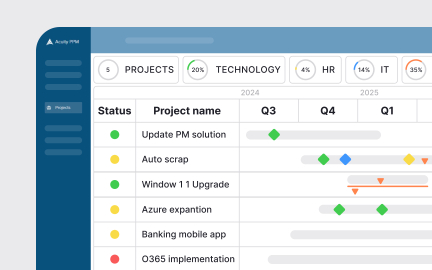Program Manager
A program manager oversees related projects across teams, aligning strategy, timelines, and outcomes to deliver business and product goals.
What is Program Manager?
Your organization struggles to coordinate multiple related projects because each initiative operates independently without strategic alignment, leading to duplicated effort, conflicting priorities, and missed opportunities to create synergistic value across interconnected work streams.
Most companies assign individual project managers without systematic coordination across related initiatives, missing the strategic oversight needed to optimize resource allocation and ensure projects work together toward broader organizational objectives and strategic outcomes.
A program manager is a senior professional who coordinates multiple related projects and initiatives to achieve strategic business objectives that individual projects cannot accomplish independently, providing cross-project leadership and resource optimization that maximizes organizational impact and value creation.
Organizations with effective program management achieve 50% better resource utilization, 40% faster strategic goal achievement, and significantly improved coordination between teams because related projects are managed as integrated initiatives rather than isolated activities.
Think about how technology companies use program managers to coordinate product launches across multiple teams and systems, or how large organizations use program management to execute strategic transformations that require coordination across departments and initiatives.
Why Program Managers Matter for Strategic Coordination
Your strategic initiatives fail to achieve intended impact because projects aren't coordinated systematically, leading to resource conflicts, missed dependencies, and organizational effort that doesn't align effectively toward strategic objectives and business outcomes.
What effective program management delivers:
Better strategic alignment and objective achievement because program managers ensure individual projects serve broader organizational goals rather than just completing isolated deliverables without connection to strategic outcomes and business value.
When projects are coordinated programmatically, organizational effort amplifies toward strategic objectives rather than competing for resources and attention without coordination and synergy optimization.
Enhanced resource optimization and efficiency through cross-project coordination that eliminates duplication while ensuring each project receives appropriate resources and support for successful completion within strategic timeframes.
Improved risk management and issue resolution because program managers identify dependencies and conflicts between projects before they become problems that delay strategic initiatives and organizational objectives.
Stronger stakeholder alignment and communication as program management provides unified view of strategic progress that enables clear communication about initiatives, timelines, and resource requirements across organizational levels.
Higher strategic initiative success rates through systematic coordination that addresses complex organizational challenges requiring multiple projects working together rather than hoping individual projects create desired strategic outcomes.
Advanced Program Management Strategies
Once you've established basic program management capabilities, implement sophisticated coordination and strategic execution approaches.
Portfolio-Level Program Management: Coordinate multiple programs across organizational portfolios rather than just individual program execution, optimizing resource allocation and strategic alignment across diverse business initiatives.
Agile Program Management and Iterative Coordination: Adapt program management to agile development methodologies that require flexible coordination while maintaining strategic alignment and cross-project integration.
Stakeholder-Centric Program Communication: Develop sophisticated communication strategies that serve different stakeholder needs across organizational levels rather than generic program reporting that doesn't address specific information requirements.
Metrics-Driven Program Optimization: Use advanced analytics and performance measurement to optimize program coordination based on actual results rather than just coordination activities without strategic impact measurement.
Step 1: Understand Strategic Objectives and Program Scope (Week 1)
Master the business objectives, strategic context, and success criteria that the program should achieve rather than just managing project schedules without understanding how initiatives connect to organizational goals and competitive strategy.
This creates program management foundation based on strategic value creation rather than just coordination activities without clear connection to business outcomes and organizational priorities.
Step 2: Map Project Dependencies and Resource Requirements (Week 1-2)
Identify relationships between projects including shared resources, deliverable dependencies, and timeline interdependencies rather than treating projects as independent activities without coordination needs and optimization opportunities.
Focus dependency analysis on factors that actually affect program success rather than comprehensive mapping that might not inform practical coordination decisions and resource allocation optimization.
Step 3: Develop Program Governance and Decision-Making Processes (Week 2)
Establish clear authority structures, communication protocols, and escalation procedures that enable effective coordination without micromanaging individual project teams and their specialized expertise.
Balance program coordination with project autonomy to ensure alignment without constraining teams' ability to execute effectively within their areas of responsibility and technical expertise.
Step 4: Implement Cross-Project Communication and Reporting Systems (Week 2-3)
Create information sharing and progress tracking that keeps stakeholders informed while enabling rapid identification of issues that require program-level intervention and resource reallocation.
Step 5: Monitor Program Performance and Optimize Coordination Continuously (Week 3)
Track program-level metrics and strategic progress rather than just individual project completion, ensuring coordination efforts actually improve strategic outcome achievement and organizational value creation.
This ensures program management generates strategic business value rather than just project administration that doesn't optimize organizational effectiveness and strategic initiative success.
If program management doesn't improve strategic outcomes, focus more on strategic alignment rather than just project coordination that might not serve broader organizational objectives effectively.
Microsoft's Windows Development Program Management
Microsoft uses sophisticated program management to coordinate Windows operating system development across hundreds of teams and thousands of developers, ensuring feature integration and release coordination that creates coherent user experiences.
Results: Successful operating system releases, effective cross-team coordination, and consistent user experience through program management that aligns technical development with strategic product vision.
Amazon's Prime Program Coordination
Amazon uses program management to coordinate Prime membership benefits across retail, streaming, delivery, and other services, creating integrated customer value that individual services couldn't deliver independently.
Their program management excellence enables seamless customer experience across diverse business units through coordination that creates competitive advantages and customer loyalty.
The Problem: Program management that becomes bureaucratic overhead rather than strategic coordination, slowing project execution without proportionally improving strategic outcomes and organizational effectiveness.
The Fix: Focus program management on coordination that actually improves strategic results rather than just administrative processes that don't enhance project success or organizational value creation.
The Problem: Program managers who lack sufficient authority or organizational support to coordinate effectively across projects and teams with different priorities and reporting structures.
The Fix: Establish clear program management authority and stakeholder support rather than expecting coordination without organizational backing and decision-making power to resolve conflicts and resource issues.
The Problem: Program coordination that focuses on project schedules and deliverables rather than strategic value creation and business outcome achievement across coordinated initiatives.
The Fix: Align program management with strategic objectives and business results rather than just project administration that doesn't connect to organizational goals and competitive advantage creation.
Create program management approaches that enhance strategic execution rather than just coordinating project activities without optimization for organizational effectiveness and business value creation.
What You'll Need: Strategic planning capabilities, cross-functional coordination skills, and 3-4 weeks for systematic program management skill development and organizational integration.
Week 1: Strategic objective mastery and program scope definition
Week 2: Dependency mapping and governance system development
Week 3: Communication system implementation and stakeholder alignment
Week 4: Performance monitoring and coordination optimization
First step you can take today:
Identify three related projects in your organization that could benefit from better coordination, then map the dependencies and potential synergies between them.
Success metrics to track:
Strategic objective achievement, resource utilization efficiency, cross-project collaboration quality, and stakeholder satisfaction with program coordination and communication.
Your program management should make strategic initiatives feel coordinated and powerful rather than collection of individual projects competing for resources without alignment toward organizational objectives.
Recommended resources
Courses

HTML Foundations

Mentorship Mastery





